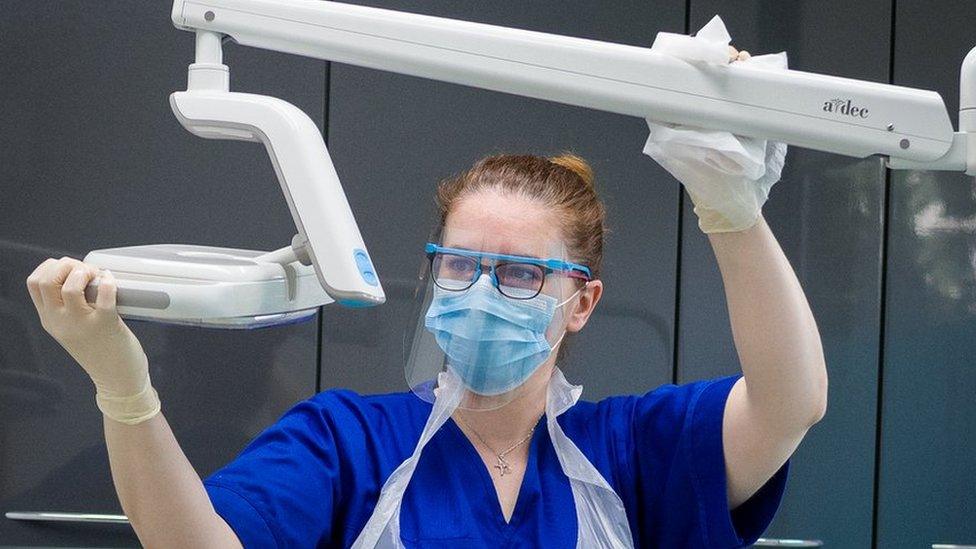Coronavirus: NI dentists' concern over missed dental check-ups
- Published
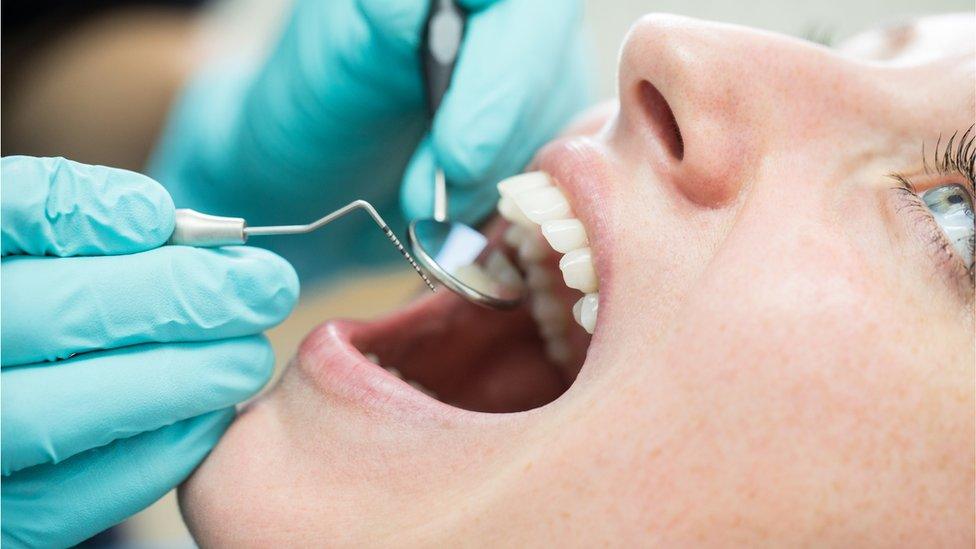
Dentists in NI have expressed concern about the impact of coronavirus restrictions on patients' oral health.
The British Dental Association (BDA) NI has warned that fewer dental check-ups may lead to serious problems not being picked up soon enough.
Compared to the same period last year, patient interactions were down 78% for the first six months of 2020/21.
Iain Hoy from the BDA NI said forced reduction in activity will "undoubtedly have implications on oral health".
He said that with "limited capacity" dentists have been asked to prioritise urgent and emergency treatments.
On Saturday, the Department of Health reported nine coronavirus-related deaths, bringing its total to 1,120.
There were 476 more confirmed cases of the virus, meaning there have been 57,733 positive tests in Northern Ireland.
NI's Health and Social Care quarterly dental statistics show that the number of patients seen by general dental service dentists in NI fell from 163,537 in February, to 8,825 in June, and rose again to 49,059 in September.
"Issues arising from routine six-month check-ups, which could have been dealt with at an early stage, could now be easily missed, leading to more significant work being required in the future," said Mr Hoy.
Routine dental care was allowed to resume in Northern Ireland from 20 July.
Many dental procedures are aerosol-generating, which means they release airborne particles which can potentially spread infection.
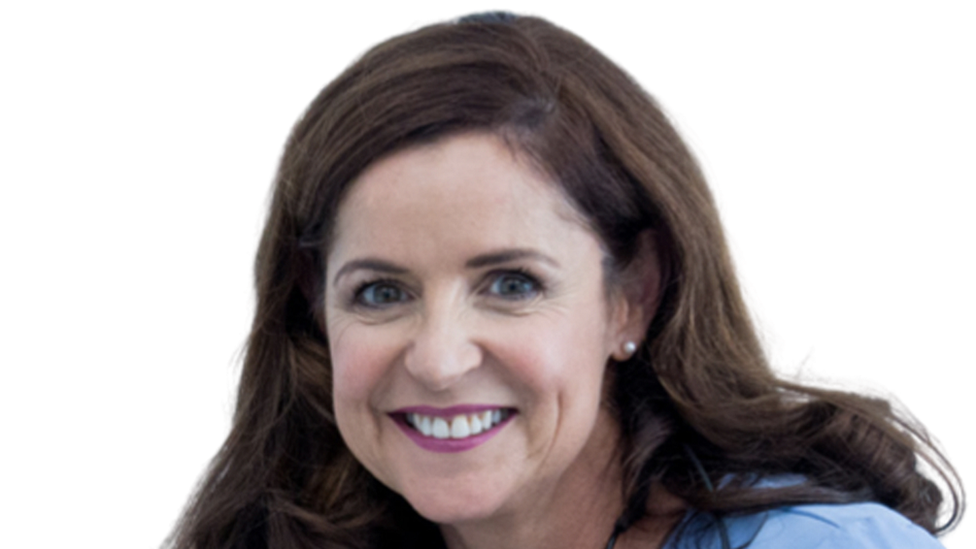
Ciara Gallagher said dentists are also worried about not being able to reinforce brushing habits in children
Coronavirus regulations mean there must be a "fallow period" to minimise the risk of transmitting the virus.
Most practices are operating at a reduced capacity because of this.
"We are carrying out some routine examinations but only a fraction of what we did pre-Covid," said Ciara Gallagher of Mullan Gallagher Dental Care in Downpatrick.
"A dental examination is an oral health screen where small dental problems in the mouth are spotted before they become big problems
"It applies equally to dental disease such tooth decay and gum disease as well as the much more serious issue of potential oral cancers," she told BBC News NI.
'Oral cancer'
Chair of the NI Dental Practice Committee, Richard Graham, told BBC News NI dentists are worried.
"I was on a call with Dr Gerry McKenna, from the Royal School of Dentistry, and he is concerned that they're not seeing the numbers of referrals that they would expect to see," he said.
"The referrals they're getting are at a later stage and, like all cancers, early diagnosis is really important for successful treatment.
"It's quite concerning," he added.
"If someone has an unexplained swelling or an ulcer that hasn't healed up after a couple of weeks, a sensation of numbness or tingling in their lip or tongue, they need to see their dentist," he said.
Dr McKenna, who is chair of BDA NI's Hospitals Group, told the British Dental Journal the "true impact" will not be felt until next year.
Mr Graham said that during routine check-ups the whole mouth is screened and "a lot is picked up in an opportunistic fashion" even when the patient is not aware of a problem.
"We often see a lesion or swelling or something that shouldn't be there - those aren't being picked up," he added.
However he said the measures in place were there to keep patients and staff safe.
Ms Gallagher said there was a worry about brushing habits in children as check-ups also "reinforce the health message, where the message from a different voice always seems to land better".
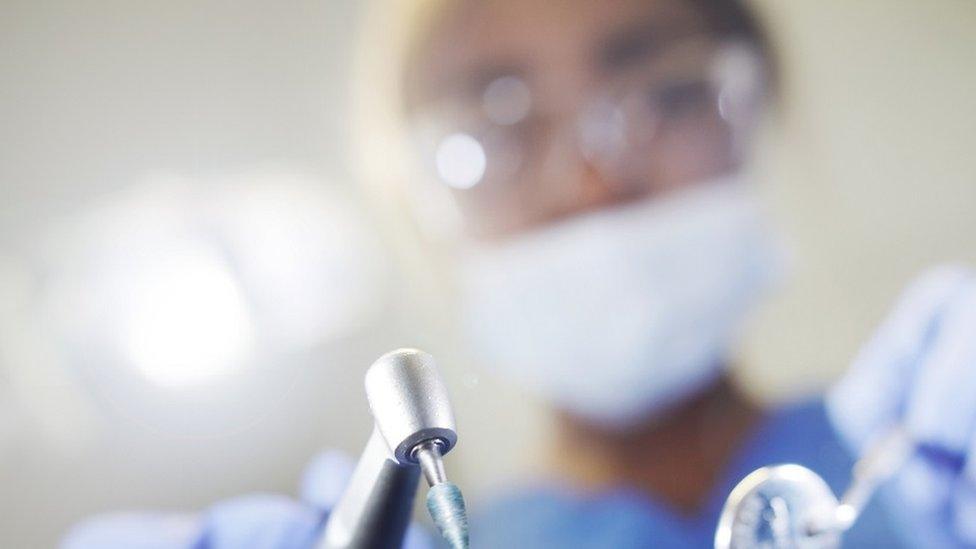
Due to the coronavirus pandemic dentist-patient interactions were down 78% for the first six months of 2020/21
Mr Graham said the Department of Health had helped the industry financially.
"It isn't perfect but we are in a situation where we have kind of stabilised the health service end of practice," he said.
However, there are concerns over private and mixed practices.
"The Department for the Economy (DE) has not stepped up and has not helped that end," he told BBC News NI.
"The issue is that the private end of dentistry has subsidised the health service end for many years. Without help, most dental practices are in trouble."
He said he knew dentists who have been living on savings for nine months.

Dentist appointments like this are currently a thing of the past
"None of the things the DE have done apply to general practice," he said.
"They keep saying: 'You're open for business.' But you can't treat people in the capacity that you were previously.
"No one wants to put fees up to the extent where you create a two-tier system."
A spokesperson for the Department for the Economy said: "The development of funding support schemes to assist businesses and individuals experiencing hardship as a result of the Covid-19 pandemic is a matter for collective executive agreement, with proposals for schemes brought forward by the responsible minister.
"The regulations setting practice guidelines and creating capacity limits for dentistry and other medical professions fall outside the responsibility of DfE."
The department also said a four-month rate holiday was provided to all businesses.
Dentist stress
Ms Gallagher said financial support from the Department of Health in respect of NHS dental care had been "a life raft for many practices which may otherwise have sunk".
"While there is a thought process that private dentistry is lucrative, and therefore could manage, no-one can manage when their incomings go to zero," she said.
She told BBC News NI that one of the biggest challenges facing her profession is "stress and uncertainty" - both physical and mental.
There is also added pressure caused by dental practices now having to work seven days a week.
Dentists do "delicate intricate procedures in the confined space of the mouth whilst wearing this restrictive clothing," she said
- Published2 June 2020
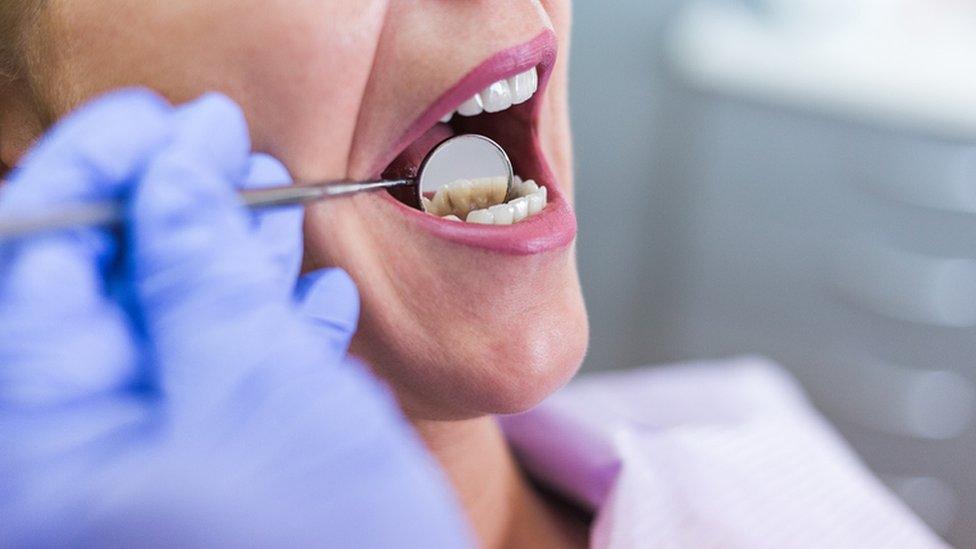
- Published12 September 2020
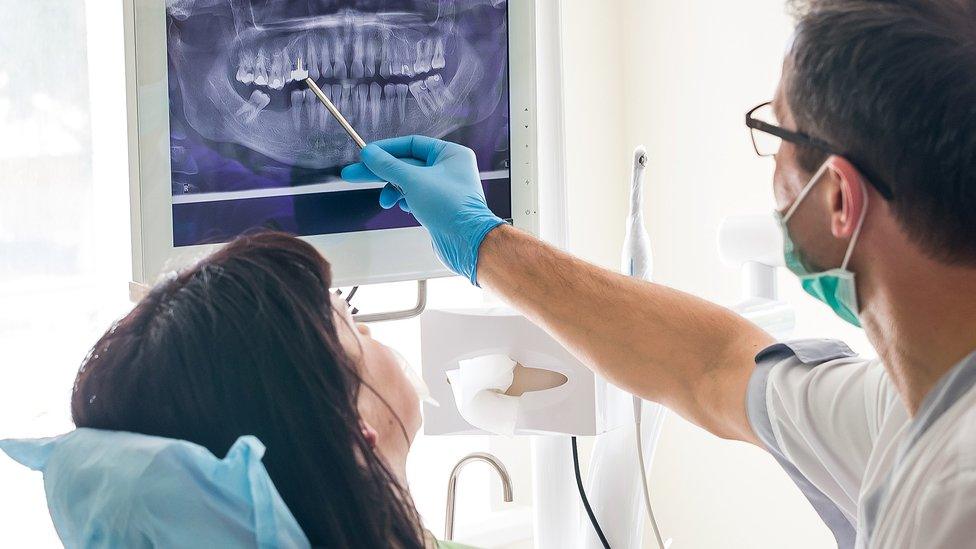
- Published5 June 2020
